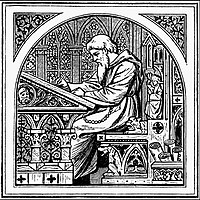Welcome to the writing portal
Introduction

Writing is the act of creating a persistent representation of human language. A writing system uses a set of symbols and rules to encode aspects of spoken language, such as its lexicon and syntax. However, written language may take on characteristics distinct from those of any spoken language.
Writing is a cognitive and social activity involving neuropsychological and physical processes. The outcome of this activity, also called "writing", and sometimes a "text", is a series of physically inscribed, mechanically transferred, or digitally represented symbols. The interpreter or activator of a text is called a "reader".
In general, writing systems do not constitute languages in and of themselves, but rather a means of encoding language such that it can be read by others across time and space. While not all languages use a writing system, those that do can complement and extend the capacities of spoken language by creating durable forms of language that can be transmitted across space (e.g. written correspondence) and stored over time (e.g. libraries or other public records). Writing can also have knowledge-transforming effects, since it allows humans to externalize their thinking in forms that are easier to reflect on, elaborate on, reconsider, and revise. (Full article...)
Selected article
Creative writing is considered to be any writing, fiction, poetry, or non-fiction, that goes outside the bounds of normal professional, journalistic, academic, and technical forms of literature. Works which fall into this category include novels, epics, short stories, and poems. Writing for the screen and stage, screenwriting and playwriting respectively, typically have their own programs of study, but fit under the creative writing category as well.
Creative writing can technically be considered any writing of original composition. In this sense creative writing is a more contemporary and process-oriented name for what has been traditionally called literature, including the variety of its genres. The practice of "professional writing" is not excluded from creative writing — one can be doing both in the same action. (Full article...)
Selected picture

Selected biography
Andrew Robinson was educated at the Dragon School, Eton College where he was a King's Scholar, University College, Oxford where he read Chemistry and finally the School of Oriental and African Studies in London. He is the son of Neville Robinson, an Oxford physicist. He is based in London and is currently a full-time writer.
Robinson has written several books about the history of writing, including:
- The Story of Writing: Alphabets, Hieroglyphs and Pictograms. Thames and Hudson (2000). ISBN 0-500-28156-4.[4]
- Lost Languages: The Enigma of the World's Great Undeciphered Scripts. McGraw-Hill (2002). ISBN 0-07-135743-2.[5][6]
- Writing and Script. Oxford University Press (2009). ISBN 9780199567782.[3][7][8] (Full article...)
Did you know...
Categories

Writing • Calligraphy • Penmanship • Writing implements • Inks • Alphabetic writing systems • Abjad • Abugida • Kanji • Logographic writing systems • Writing systems • Cyrillic alphabets • Hellenic scripts • Script typefaces
Major topics
• Calligraphy •
Western calligraphy • Islamic calligraphy • Indian calligraphy • Chinese calligraphy • Korean calligraphy • Japanese calligraphy • Persian calligraphy • Manuscript
• Writing instruments •
Pen • Ink brushes • Inks • Ink stone • Qalam • Quill • Dip pen • Nib • Paper • Writing slate • Pencil • Typewriter • Word processor • Dry erase marker • Touchscreen
Things you can do
 |
Here are some tasks awaiting attention:
|
WikiProjects
Related portals
Associated Wikimedia
The following Wikimedia Foundation sister projects provide more on this subject:
-
Commons
Free media repository -
Wikibooks
Free textbooks and manuals -
Wikidata
Free knowledge base -
Wikinews
Free-content news -
Wikiquote
Collection of quotations -
Wikisource
Free-content library -
Wikispecies
Directory of species -
Wikiversity
Free learning tools -
Wikivoyage
Free travel guide -
Wiktionary
Dictionary and thesaurus
References
- ^ Andrew Robinson (1), LibraryThing.
- ^ Books by Andrew Robinson, Alibris.
- ^ a b Mark Twaite, Interview with Andrew Robinson, The Book Depository, 2009.
- ^ Andrew Robinson, Andrew Robinson on the story of writing. The Times, 29 September 2007.
- ^ James McConnachie, Lost Languages: The Enigma of the World's Undeciphered Scripts by Andrew Robinson. The Sunday Times, 8 March 2009.
- ^ Andrew Robinson, Decoding antiquity: Eight scripts that still can't be read. New Scientist, 27 May 2009.
- ^ Steven Poole, Writing and Script by Andrew Robinson. The Guardian, 19 September 2009.
- ^ Greg Neale, "Book reviews: Writing and Script". Oxford Today, 22(2):37, 2010.












